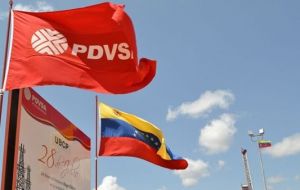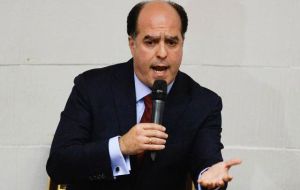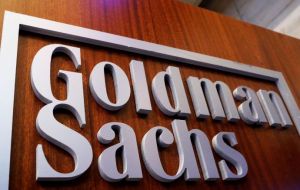MercoPress. South Atlantic News Agency
Nomura Securities admits having purchased Venezuelan government bonds
 The bonds at the centre of the controversy were originally issued by Petroleos de Venezuela (PDVSA), the state-run oil and natural gas company, in 2014.
The bonds at the centre of the controversy were originally issued by Petroleos de Venezuela (PDVSA), the state-run oil and natural gas company, in 2014.  Both banks bought them at knock-down prices. Mr. Borges, who is president of the country's opposition-run Congress, said Goldman had paid 31 cents on the dollar.
Both banks bought them at knock-down prices. Mr. Borges, who is president of the country's opposition-run Congress, said Goldman had paid 31 cents on the dollar.  Goldman argued its asset-management arm acquired the bonds “on the secondary market from a broker and did not interact with the Venezuelan government”.
Goldman argued its asset-management arm acquired the bonds “on the secondary market from a broker and did not interact with the Venezuelan government”. Japanese investment bank has admitted it was part of a controversial deal with Goldman Sachs to buy Venezuelan government bonds. Nomura Securities said it also bought about US$100m worth of the bonds last week, according to Reuters reports. Goldman Sachs has faced fierce criticism for its purchase of $2.8bn worth of similar bonds.
Opposition leader Julio Borges accused Goldman of “aiding and abetting the country's dictatorial regime”. Venezuela's government, led by President Nicolas Maduro, is desperately in need of financial support. He has also drawn international condemnation for abuses of power and human rights violations, and his opponents say the purchase has given him a financial lifeline.
Venezuela's oil-dependent economy, crippled by low oil prices, has been in recession for four years, and now faces shortages of food and medicine, with inflation thought to be about 800%. On Wednesday the country devalued its Bolivar currency by 64%, from 721 to 2,010 bolivars to the dollar. However, on the black market the Bolivar has sunk to about 6,000 to the dollar.
In the last two months, there have been over 60 deaths among protestors demanding early elections, freedom for jailed activists and foreign humanitarian aid. Maduro says the protests are a violent attempt at a coup and insists the country is the victim of an “economic war” supported by Washington.
The bonds at the centre of the controversy were originally issued by Petroleos de Venezuela (PDVSA), the state-run oil and natural gas company, in 2014. Both banks bought them at knock-down prices. Mr. Borges, who is president of the country's opposition-run Congress, said Goldman had paid 31 cents on the dollar.
Goldman said its asset-management arm acquired the bonds “on the secondary market from a broker and did not interact with the Venezuelan government”.
“We recognize that the situation is complex and evolving and that Venezuela is in crisis. We agree that life there has to get better, and we made the investment in part because we believe it will,” the investment bank added.
Mr. Borges said: “As hard as it may try, Goldman Sachs ... cannot put lipstick on this pig of a deal for Venezuelans”. Venezuela's opposition-controlled National Assembly voted on Tuesday to ask the US Congress to investigate the Goldman deal, which they called immoral and opaque. Borges said he would recommend that any future democratic government “not recognize or pay those bonds”.




Top Comments
Disclaimer & comment rulesCommenting for this story is now closed.
If you have a Facebook account, become a fan and comment on our Facebook Page!